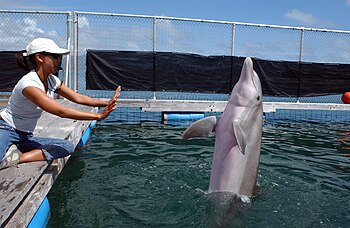From Wikipedia, the free encyclopedia
The Thought Police (thinkpol in Newspeak) are the secret police of Oceania in George Orwell's dystopian novel Nineteen Eighty-Four.
It is the job of the Thought Police to uncover and punish thoughtcrime and thought-criminals. They use psychology and omnipresent surveillance (such as telescreens) to search, find, monitor and arrest members of society who could potentially challenge authority and status quo, even only by thought, hence the name Thought Police.[1] They use terror and torture to achieve their ends.
It also had much to do with Orwell's own "power of facing unpleasant facts," as he called it, and his willingness to criticize prevailing ideas which brought him into conflict with others and their "smelly little orthodoxies."[2]
Operations
- The government (controlled entirely by the Inner Party) attempts to control not only the speech and actions, but also the thoughts of its subjects, labelling unapproved thoughts with the term thoughtcrime, or crimethink in Newspeak.
- It was the Thought Police that had arrested Winston and Julia.
- The Thought Police operate a false resistance movement in order to lure in disloyal Party members before arresting them. One of the Thought Police's agents, O'Brien, is part of this false flag operation. It is not revealed however, if a genuine resistance movement actually exists, though the tactic of using a false resistance group to lure out dissidents was used by the State Political Directorate in the Soviet Union.
- Every Party member has a telescreen in his or her home, which the Thought Police uses to observe their actions and take note of anything that resembles an unorthodox opinion or an inner struggle. When a Party member talks in their sleep, the words are carefully analyzed.
- The Thought Police also target and eliminate highly intelligent people, since they may come to realize how the Party is exploiting them. An example of this was Syme, a developer of Newspeak, who, despite his fierce devotion to the Party, simply disappeared one day. Winston rebels against the Thought Police by writing "DOWN WITH BIG BROTHER" in his journal (which he is not even allowed to have) without knowing it. He attempts to cover up his own thoughts, but believes he will be caught quickly.
- The Thought Police generally interfere very little with the Proles, although a few agents always move among them, spreading false rumours, identifying and eliminating any individual deemed capable of independent thought or rebellion against the Party.
- All Party members live their lives under constant supervision of the Thought Police.
- In order to remove any possibility of creating martyrs, whose memories could be used as a rallying cause against the Party, the Thought Police gradually wear down the will of political prisoners in the Ministry of Love through torture, conversations, degradation, and finally, Room 101. The methods are designed to eventually make the prisoner genuinely accept Party ideology, and come to love Big Brother, and not merely confess. After being released back into society for a short while, they are re-arrested, charged with new offences, and executed. All people who knew them forget them through crimestop, and all records are destroyed and replaced with falsified records by the Ministry of Truth. Their bodies are disposed of via cremation.
Other uses
In the first half of the twentieth century, prior to the publication of 1984, the Special Higher Police (Tokko) in Japan were sometimes known as the Thought Police.[3]The term "Thought Police," by extension, has come to refer to real or perceived enforcement of ideological correctness, or preemptive policing where a person is apprehended in anticipation of the possibility that they may commit a crime, in any modern or historical contexts.
